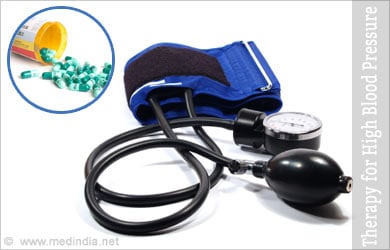- Combination therapy in hypertension: An update - (http://www.dmsjournal.com/content/2/1/44)
- Cardiology - (http://www.theheart.org/article/1171441.do)
- Initial Monotherapy and Combination Therapy and Hypertension Control the First Year - (http://hyper.ahajournals.org/content/early/2012/05/07/hypertensionaha.112.194167.abstract)
About
Hypertension, the medical term for

The commonly used anti-hypertensive agents that treat high blood pressure include -
- Diuretics - work in the kidney and flush excess water and sodium from the body.
- Beta-blockers - reduce nerve impulses to the heart and blood vessels making the heart beat slower and with less force. This causes lowering of blood pressure.
- ACE (Angiotensin converting enzyme) inhibitors - prevent the formation of a hormone called angiotensin II that narrows blood vessels and causes high blood pressure.
- Angiotensin antagonists or angiotensin receptor blockers (ARBs) – shield the blood vessels from angiotensin II, thus making them more relaxed.
- Calcium channel blockers (CCBs) – do not allow calcium to enter the muscle cells of the heart and blood vessels, thus causing the blood vessels to relax and reducing the force of contraction of the heart.
- Alpha-blockers – lower blood pressure by reducing nerve impulses to blood vessels and allow blood to pass more easily.
- Alpha-beta-blockers – reduce nerve impulses to blood vessels and also slow the heartbeat to lower blood pressure.
- Nervous system inhibitors - relax blood vessels by controlling nerve impulses.
- Vasodilators - open blood vessels by relaxing the muscle in the vessel walls.









